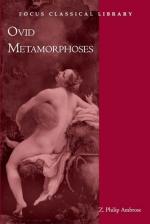|
This section contains 5,396 words (approx. 18 pages at 300 words per page) |

|
SOURCE: Lyne, Raphael. “Ovid, Golding, and the ‘Rough Magic’ of The Tempest.” In Shakespeare's Ovid: The Metamorphoses in the Plays and Poems, edited by A. B. Taylor, pp. 150-64. Cambridge, England: Cambridge University Press, 2000.
In the following essay, Lyne discusses Shakespeare's use of Ovid in The Tempest, distinguishing between imitation and allusion as modes of adapting his stories. Lyne reads The Tempest as intertextual dialogue, not only between Shakespeare and Ovid, but also including Golding as translator.
The influence of Ovid on Shakespeare does not end with his last sole-authored play, The Tempest, but it reaches a kind of climax there—and a kind of crisis.1 It is well known that this play includes one of his most sustained passages of close imitation of any author: Prospero's invocation (5.1.33-57) consistently echoes that of Medea in the Metamorphoses (vii.196-209). What is less well known is the way that...
|
This section contains 5,396 words (approx. 18 pages at 300 words per page) |

|


